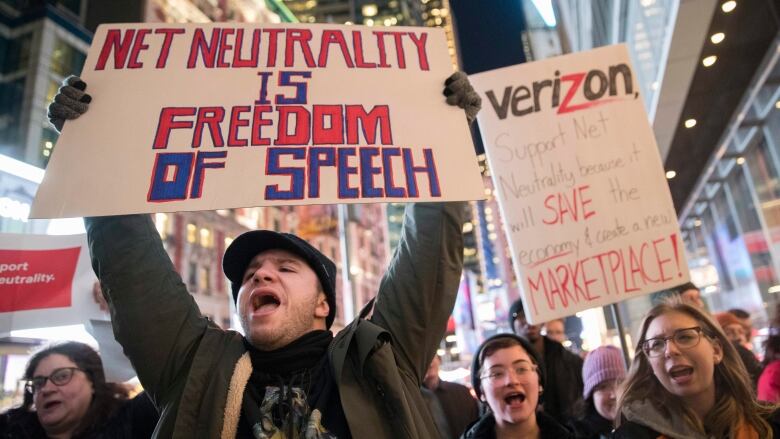Why the end of net neutrality threatens democracy itself

Last month, the Federal Communications Commission in the U.S. voted to repeal net neutrality — a decision that was met by widespread public and political opposition.
Since that vote, the cyberworld has been aflame with warnings that the end of the internet as we know it is nigh.
Tim Wu is credited with coining the term "net neutrality" in 2003.
He says the repeal of the idea is a threat to democracy itself.
"Net Neutrality, the freedom to speak without being blocked, is pretty fundamental," he tells The Sunday Edition guest host Gillian Findlay.
"You may dislike some of what has come out of the internet boom — there's been a lot of craziness, I don't deny it. But there is something fundamental about the ability to reach people ... that is guaranteed by net neutrality."

Tim Wu is also the author of several critically acclaimed books, including The Master Switch and The Attention Merchants.
Net neutrality, he says, is "the idea that the internet should be understood as kind of a commons where every site can be reached and your cable or phone company can't block certain sites because it doesn't like them, or charge them more to reach people so that the big guys always win."
"It is sort of an equality principle," he adds. "It's embodied in the original design of the internet, going back to the 70s and some of the more idealistic engineers who created this network to be a network of networks to support anything, to do anything."
We face, in some ways, as many threats to our freedom from a private power as we do from public.- Tim Wu
Net neutrality has been the governing principle of the internet since George W. Bush was in power. In 2015, the Obama administration declared the internet not simply an information service but a public utility.
But the idea has often come under attack.
For years, the big internet service providers have lobbied lawmakers to get rid of net neutrality.

"This is one thing the cable industry doesn't like... the idea of the cable bill not getting larger," he says. "So there's a battle behind this which is basically about billing which I think is secretly driving a lot of this."
Wu challenges the claim by phone and cable companies that they need higher profits to provide faster connections.
"They make a killing as it is… They haven't lacked any incentives to deploy internet service because it's such a good moneymaker. They just want ways to charge people for more."
Wu fears that internet service may become more and more expensive to the consumer without necessarily being any better.
It could begin to look like the airline business model, he warns, "where everything is an add-on."
What kind of bargaining power do you have when you're bargaining with your cable company over internet access? You don't really have any other options.- Tim Wu
For Wu, the unequal power relation between consumers and internet providers is a source of major concern.
"We're talking about the relationship between what are frankly almost always monopolists or duopolists and the individual," he says.
"What kind of bargaining power do you have when you're bargaining with your cable company over internet access? You don't really have any other options. So we have no bargaining power."
These are situations, Wu adds, where the government is typically asked to intervene. Instead, he says, the repeal by the Trump administration allows an unregulated monopolist to do as it wishes.

"You just have this kind of private power over the individual which at its extreme starts to resemble that of a very powerful state, like the Chinese state, where they know everything about you and can charge as much money as [they] want.
"And I don't call that freedom. Frankly I think we face, in some ways, as many threats to our freedom from a private power as we do from public."
Click 'listen' above to hear the full interview.